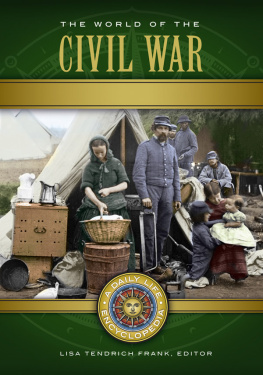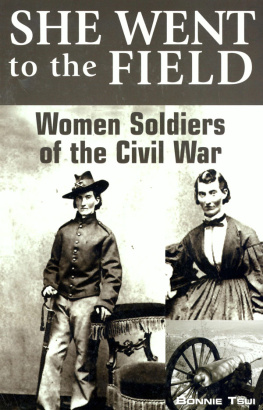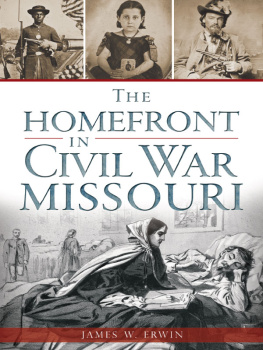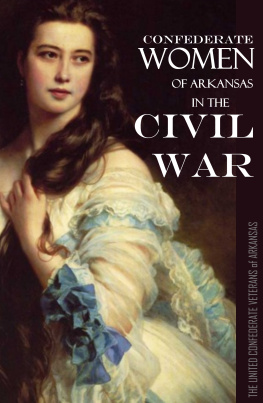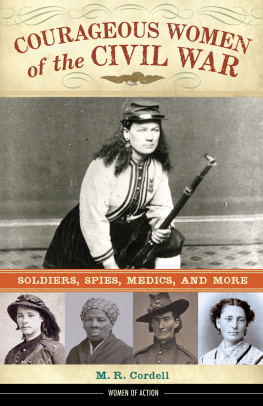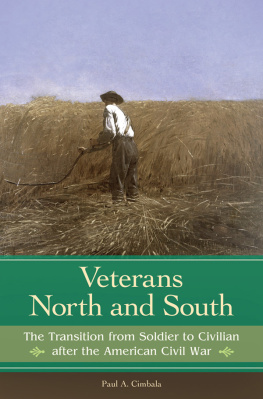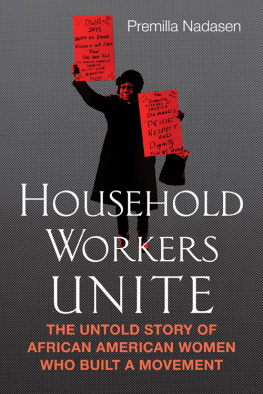AFTERWORD
From Household to Personhood in America
STEPHEN BERRY
The first-ever U.S. census, taken in 1790, only lists the names of heads of households, most of whom were men, with their dependents enumerated but unnamed below them. The 1850 census lists every free man, woman, and child in America; the enslaved are counted but remain nameless on a separate schedule. The 1870 census is an expansive list of Americans; there is only one schedule and all persons are named.
State bureaucracy can care about people for right and wrong reasons. Hitlers Germany was ruthlessly precise about who was who. However, this simple snapshot of the censusof how a state seesis telling. In 1790, we were a nation of households. In 1850 we were a nation that recognized whites as people and blacks as (mostly) things. In 1870, most of us had a line; we were all people, all a datum in the brain of the state.
The Civil War was the critical point in this transformation of who counts as a person in America. This volume is a meditation on who counts: Should the Civil War be written as a history of (mostly) white men and their guns, or should it be written as the history of every man, woman, and child who had a stake in, and an influence upon, the outcome of a global event? And, if the latter, what theoretical framework do we have to contain it all?
In 1860, Americans lived in houses, not homes. Homes came later, after the transition from a household economy to an industrial one and after the rise of the middle class. A home was presided over by a woman who created a sanctuary for her husband and then for herself and her children. For a hundred years after she first created a home, her labor did not count in the same way as did her husbands or in the same way as it had in the preindustrial
In 1860, most Americans still lived in houses, irreducible loci of production and reproduction, economic units as much as familial ones. The word husband comes from the Old Norse hs (house) coupled to bndi (tiller of the soil). In its very etymology, husband is the center of the house, and the house is the center of economic activity. The etymology of wife is very differentit simply means woman. Such etymological explorations bring context to the term household. It was created precisely to encompass a husband, a wife, and the children and servants that a husbands hs protected and exploited. The word hold, like the word keep, implied a place of physical protection, the penumbra of safety around an (ostensibly) powerful male. Hold had other, equally relevant meanings: to have or keep in the hand; keep fast; grasp; to keep in a specified state or relation. A household system was a system that subsumed, not a system that liberated.
When Lincoln invoked the House Divided, his listeners knew precisely where he was coming from: And Jesus knew their thoughts, and said unto them, Every kingdom divided against itself is brought to desolation, and every city or house divided against itself shall not stand. Before the twentieth century, house/city/kingdom were the nesting dolls of the patriarchal order. To invoke a house falling was to conjure an image not of walls collapsing but of masculine obliteration in an assault on the household itselfthe Fall of the House of Usher.
For Confederates, the Civil War represented a colossal threat to houses and households. Dwellings, barns, smokehouses, outbuildings, fences, crops, and livestock destroyed, cities occupied and put to the torch, wives threatened, families scattered, servants liberated, sons murdered nothing to pass down, no one to pass it down to anywaythe Fall of the House of Dixiepatriarchal obliteration. Such destruction was not incidental to the conflict, as this book shows, but central to how the Civil War was prosecuted and won.
The conflict was a household war on the federal side, too. Yes, a political sensibilityUnionsent men sprinting into a cannons mouth, but it was no mere abstraction. In seeking a word to describe a collective of states, the word union had been chosen precisely because it borrowed against its familial and marital meanings. By 1860, Union had become the Federals paternity, their inheritance, their houseeverything that had to be transmitted from Founding Fathers to freedom-loving sons. The Slave Powers plot to nationalize slaveryto take enslaved African Americans everywherewas equally threatening to the households of Northern white
For the enslaved, enslavement had always been a household war; the Civil War only intensified the conflict. For generations, enslaved people had carved out their own cultural and social spaces in staggering acts of imagination and will. Still they had neither wives nor children who couldnt be threatened with rape or sale, no sons who could be sent out into the world to carry on the family name. No wonder then that as Washington politicians wrangled about the language of the Thirteenth, Fourteenth, and Fifteenth Amendments, freedpeople went to work erecting houses, reuniting their families, pulling their women from the field, and sending their children to school. They too sought to protect human dignity as they knew it, including its cornerstone: the (black) patriarchal household.
To understand the Civil War as a household war is to escape, finally, the homefront/battlefront binary. Buffs may continue to understand the Civil War as the narrow work of men and guns, but since the 1990s, scholars working on guerrilla warfare, contraband camps, occupation studies, Confederate politics, and Civil War refugees have proven that, even in a narrow military sense, the Civil War cannot be understood as a sequence of battles, and Civil War battles cannot be physically separated from the homefront. What Household War offers is an analytical framework to contain the insights of everyonethe military historians on the one side and the historians of race, labor, and gender on the other.
Ironically, the household itself, as defined here, did not long survive the Civil War. In Paul E. Johnsons classic A Shopkeepers Millennium, the early national household is portrayed deftly as an extended economic unit as much as a familial one. A man who made wagon wheels, for instance, went out to his barn in the morning with his apprentice and they drank from the same flask and told the same jokes as they made and sold wagon wheels
Before and especially after the Civil War, modernization, a word that means everything and nothing, split the atom, broke the household apart: no more handmade wagon wheels, no more apprentices, no more sales mediated by handshakes and smiles and inquiries about Aunt Ednas gallstones. The wheels were now made on an assembly line. The manager made bank selling bulk to strangers; the linemen got drunk and told their own (dirtier) jokes; middle-class women quit working in one sense to start working in another, reforming the hard edges of the world that capitalism had wrought, presiding over homes, not houses, the new centers of the consumer economy and oases from the industrial one.
Splitting the atom, however, made it possible for all to have an individual relationship to themselves and the market. A modern understanding of personhood would be erected on the ruin of the premodern understanding of household. Here the Civil War played an enormous role. When ratified in 1868, the Fourteenth Amendment defined, for the first time, American citizenship and the rights thereunto appertaining, beginning a process of enshrining in law the worlds first great postulation of personhood: We hold these truths to be self-evident
No war is the sum of its means; every war is the sum of its consequences. Fought by and upon American households, the Civil War ironically struck a devastating blow to the household as the constituent unit of American life. The full process would be a slow one, winding through Klan rallies, spousal beatings, and failed Equal Rights Amendments on a circuitous road to a Universal Declaration of Human Rights. But the Civil War did much to place the sanctity of the individual (as a legal entity) ahead of the sanctity of the household (as an organic economic and patriarchal entity). Both systems have their value and values; only one has a future.



